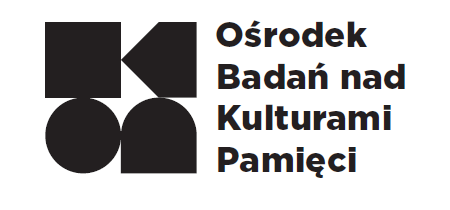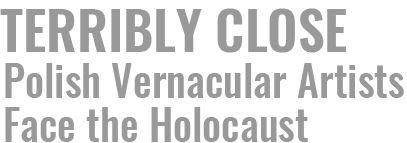Project
We documented all of the works we found. Among the 400 works photographed, about 60 contain direct references to the Holocaust. These include representations of historical events as well as commentaries on them, neither always clear or self-evident. The exhibit’s sculptures includes Władysław Chajec’s „Nazis” (1967), Adam Zegadło’s „Shared Fate” (1969), Wacław Czerwiński’s „The Last Embrace” (1983), Zygmunt Skrętowicz’s „Auschwitz” series (1963), Jan Staszak’s “Gas” (1969), Jan Wojtarowicz’s “German Factories” (ca. 1970), as well as Adam Czarnecki’s paintings “Banishment of the Jews from Pierzchnica” (1959) and “Jews to Work” (1965-67).
This exhibition is the result of a research project. Its initial impetus was a survey ofethnographic museum collections, looking for artistic responses to the Holocaust. Our questions quickly multiplied: How are these objects treated today? What are their biographies? What do they actually depict? What emotions surround them? The research, which began in 2016 in Poland and Germany, involved investigation of institutional and private collections (those of Ludwig Zimmerer, Marian Pokropek, Leszek Macak, Walter Graetz, Louis Galinski, and others), interviews with artists (including Roman Śledź from Malinówek near Lublin, Jarosław Furgałą from Brzeg, Włodzimierz Naumiuk fromKaniuki, Jan Kowalczyk from Koszalin) and their descendents, and conversations with collectors and their caretakers, as well as exhibition curators. The research was carried out by the curators of the present exhibit: Erica Lehrer, Roma Sendyka, WojciechWilczyk, Magdalena Zych.
The project is part of the research project Transmitting Contentious Cultural Heritages with the Arts: From Intervention to Co-Production: TRACES (2016–2019). Implemented as part of the European Commission Horizon 2020 Reflective Society program, its purpose is to interpret contentious heritage. The experimental research carried out by the TRACES team involves building multilateral collaborations among the academy, museums, and artists.
AUTHORS
Research and curatorial team
Erica Lehrer (Concordia University, Montreal), Roma Sendyka (project leader, Jagiellonian University, Kraków), Wojciech Wilczyk (photographer), Magdalena Zych (The Ethnographic Museum
in Kraków)
Collaborators
Barbara Kożuch, Natalia Giemza, Monika Gromala, Katarzyna Grzybowska, Karina Jarzyńska, Uta Karrer, Maria Kobielska, Karolina Koprowska, Lucyna Leś, Jakub Muchowski, Sylwia Papier, Amudena Rutkowska, Kinga Siewior, Aleksandra Szczepan, Klaudia Węgrzyn
Exhibition consultation
Anna Grajewska, Aleksandra Janus, Ewa Klekot, Katarzyna Maniak
Exhibition and graphic design
Monika Bielak
Website
Monika Bielak (design), Patrycja Maksylewicz (development), Wojciech Wilczyk (photos)
Translation
Erica Lehrer, Victoria Miluch, Zofia Ziemann
INDIVIDUALS AND INSTITUTIONS
Individuals who gave access to their collections for research and exhibition preparation, and institutions that loaned objects for the exhibition.
Collectors
Louis and Christa Galinski, Walter Graetz, Jacek Łodziński, Leszek Macak, Marian Pokropek
Artists
Józef Furgała (Brzeg), Bolesław Parasion (Cyców), Roman Śledź (Cyców-Malinówka), Jan Kowalczyk (Koszalin), Włodzimierz Naumiuk (Kaniuki), Stanisław Żywolewski (Hajnówka), Andrzej Kozłowski (Skarżysko Kamienna), family of Adam Czarnecki (Pierzchnica), family of Franciszek Wacek (Przysietnica)
Institutions
Gdańsk Ethnographic Museum, branch of the Gdańsk National Museum; Szczecin National Museum; Maria Znamierowska-Prüfferowa Ethnographic Museum in Toruń; Museum of the Mazovian Countryside, Sierpc; Museum of European Cultures, Berlin; Wrocław Ethngraphic Museum, branch of the Wrocław National Museum; Libiąż Cultural Center; Memorial and Museum Auschwitz-Birkenau; Seweryn Udziela Ethngraphic Museum, Kraków; Podlasie Museum of Folk Culture; Krzysztof Kluk Museum of Agriculture, Ciechanów; POLIN Museum of the History of Polish Jews; Emanuel Ringelblum Jewish Historical Institute; National Ethnographic Museum in Warsaw; Folk Art Museum, Otrębusy; Museum of Radom Village; Folk Artists’ Association in Lublin; Majdanek State Museum; Museum of Polish Village Martyrology, Michniów; Kielce National Museum; Jan Karski Society, Kielce; Dr. Janusz Peter Regional Museum, Tomaszów Lubelski; Museum of Folk Culture, Kolbuszowa; Franciszek Kotula Ethnographic Museum, Rzeszów; Regional Museum in Jasło; Sądecki Ethnographic Park, branch of the Nowy Sącz Regional Museum
The project was carried out under the auspices of the Faculty of Polish Studies of the Jagiellonian University, Center for Research on Memory Cultures.








